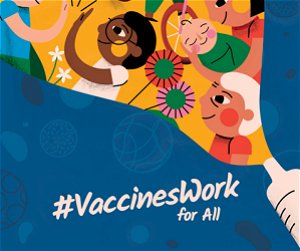 Among the many concerns raised by the COVID-19 crisis, one question many people have is whether they should still get their annual flu shot. The 2020-2021 flu season is here, and this is the time of year when many individuals and families visit their doctors, pharmacies and health departments to get vaccinated. Continue reading
Among the many concerns raised by the COVID-19 crisis, one question many people have is whether they should still get their annual flu shot. The 2020-2021 flu season is here, and this is the time of year when many individuals and families visit their doctors, pharmacies and health departments to get vaccinated. Continue reading
Tag Archives: vaccine injury lawyer
Resources from World Immunization Week 2020
 Each year, the World Health Organization (WHO) recognizes World Immunization Week during the last week of April. For 2020, the theme was #VaccinesWork for All, and the WHO focused its awareness campaign on, “how vaccines as well as the people who develop, deliver and receive them are . . . champions by working to protect the health of everyone, everywhere.” Continue reading
Each year, the World Health Organization (WHO) recognizes World Immunization Week during the last week of April. For 2020, the theme was #VaccinesWork for All, and the WHO focused its awareness campaign on, “how vaccines as well as the people who develop, deliver and receive them are . . . champions by working to protect the health of everyone, everywhere.” Continue reading
Can a Vaccine Cause Vasovagal Syncope?
 Vasovagal syncope, a condition that results in fainting due to a sudden drop in heart rate and blood pressure, is a condition that has been linked to several of the standard vaccinations that are recommended by the U.S. Centers for Disease Control and Prevention (CDC). While only a very small percentage of vaccine recipients will experience vasovagal syncope as a result of their vaccinations, for those that do, the consequences can potentially be severe. Continue reading
Vasovagal syncope, a condition that results in fainting due to a sudden drop in heart rate and blood pressure, is a condition that has been linked to several of the standard vaccinations that are recommended by the U.S. Centers for Disease Control and Prevention (CDC). While only a very small percentage of vaccine recipients will experience vasovagal syncope as a result of their vaccinations, for those that do, the consequences can potentially be severe. Continue reading
FAQs: Shoulder Pain and Vaccine Injury Compensation
 Shoulder injury related to vaccine administration (SIRVA) is among the most common of all vaccine-related injuries and illnesses. This is due predominantly to the fact that they are caused by vaccination errors rather than vaccine ingredients, which means that all vaccines that are administered via injection into the shoulder have the potential to cause SIRVA. Here are answers to some frequently-asked questions about recovering financial compensation for SIRVA under the National Vaccine Injury Compensation Program (VICP): Continue reading
Shoulder injury related to vaccine administration (SIRVA) is among the most common of all vaccine-related injuries and illnesses. This is due predominantly to the fact that they are caused by vaccination errors rather than vaccine ingredients, which means that all vaccines that are administered via injection into the shoulder have the potential to cause SIRVA. Here are answers to some frequently-asked questions about recovering financial compensation for SIRVA under the National Vaccine Injury Compensation Program (VICP): Continue reading
NIAID Director: 2019-2020 Flu Shot “Not a Very Good Match” for Most-Common Strain
 As the 2019-2020 flu season rolls on, the director of the National Institute of Allergy and Infectious Diseases (NIAID) has issued a warning that this year’s flu vaccine has shown limited effectiveness in fighting one of the most-common strains of the flu virus. According to CNN, NIAID director Dr. Anthony Fauci stated that this year’s flu shot, “[is] not a very good match for B/Victoria,” which has become one of the most-prevalent strains this flu season. CNN also reports that, “[c]hildren are particularly susceptible to influenza B/Victoria.” Continue reading
As the 2019-2020 flu season rolls on, the director of the National Institute of Allergy and Infectious Diseases (NIAID) has issued a warning that this year’s flu vaccine has shown limited effectiveness in fighting one of the most-common strains of the flu virus. According to CNN, NIAID director Dr. Anthony Fauci stated that this year’s flu shot, “[is] not a very good match for B/Victoria,” which has become one of the most-prevalent strains this flu season. CNN also reports that, “[c]hildren are particularly susceptible to influenza B/Victoria.” Continue reading
Flu Shot Recommendations for Pregnancy, Asthma and Other Medical Conditions
 While getting vaccinated against influenza is important for everyone, the flu shot can have particular benefits for individuals with certain health conditions. As an infectious disease specialist recently told NPR:
While getting vaccinated against influenza is important for everyone, the flu shot can have particular benefits for individuals with certain health conditions. As an infectious disease specialist recently told NPR:
“As we get older, more of us get heart disease, lung disease, diabetes, asthma. . . . Those diseases predispose us to complications of flu — pneumonia, hospitalization or death. We need to make vaccination a routine part of chronic health management.”
CDC: Infant Flu Hospitalizations are Significantly Higher than Expected
 According to recent data from the Centers for Disease Control and Prevention (CDC), infant flu hospitalizations in several countries are “at least double previous estimates.” Although the list of countries does not include the United States, the study nonetheless sheds light on some important considerations for health care providers and parents domestically. Continue reading
According to recent data from the Centers for Disease Control and Prevention (CDC), infant flu hospitalizations in several countries are “at least double previous estimates.” Although the list of countries does not include the United States, the study nonetheless sheds light on some important considerations for health care providers and parents domestically. Continue reading
CDC Releases FAQs for the 2019-2020 Flu Season
 The 2019-2020 flu season is here. Each flu season, well over 100 million Americans get vaccinated, and the Centers for Disease Control and Prevention (CDC) estimate that, on average, the flu shot protects 40 to 60 percent of recipients against infection annually.
The 2019-2020 flu season is here. Each flu season, well over 100 million Americans get vaccinated, and the Centers for Disease Control and Prevention (CDC) estimate that, on average, the flu shot protects 40 to 60 percent of recipients against infection annually.
5 Highlights from the CDC’s 2019-2020 Flu Season FAQs
For individuals and parents who have questions about the annual flu shot, the best thing to do is to consult with your physician. However, the CDC has also published answers to a number of frequently-asked questions (FAQs) about the flu vaccine for the 2019-2020 flu season. Here are some of the highlights: Continue reading
You Have Been Diagnosed with a Vaccine-Related Injury or Illness. What Now?
 If you have been diagnosed with Shoulder Injury Related to Vaccine Administration (SIRVA), Guillain-Barre Syndrome (GBS), or another vaccine-related injury or illness, understanding the steps to take following your diagnosis will be critical to your health and your financial stability. The treatment options for certain types of vaccine-related injuries and illnesses are limited; and, in order to recover as quickly and fully as possible, you need to make sure you receive appropriate treatment and avoid mistakes that could have negative long-term consequences.
If you have been diagnosed with Shoulder Injury Related to Vaccine Administration (SIRVA), Guillain-Barre Syndrome (GBS), or another vaccine-related injury or illness, understanding the steps to take following your diagnosis will be critical to your health and your financial stability. The treatment options for certain types of vaccine-related injuries and illnesses are limited; and, in order to recover as quickly and fully as possible, you need to make sure you receive appropriate treatment and avoid mistakes that could have negative long-term consequences.
7 Steps to Take Following a Vaccine-Related Injury or Illness Diagnosis
Here are seven steps you can take to protect your health and your legal rights if you have been diagnosed with a vaccine-related injury or illness: Continue reading
Is it SIRVA? Diagnosing Shoulder Pain Following a Vaccination
 When you get a flu shot or other vaccination, it is normal to experience mild pain at the injection site. But, what if your pain lingers? What if it gets worse over time? What if you start to experience other effects, such as reduced strength or limited mobility in your shoulder? These are all possible symptoms of a class of injuries known as “shoulder injury related to vaccine administration,” or “SIRVA.”
When you get a flu shot or other vaccination, it is normal to experience mild pain at the injection site. But, what if your pain lingers? What if it gets worse over time? What if you start to experience other effects, such as reduced strength or limited mobility in your shoulder? These are all possible symptoms of a class of injuries known as “shoulder injury related to vaccine administration,” or “SIRVA.”
Unlike other common vaccine injuries, SIRVA do not result from adverse reactions to particular vaccine ingredients. Instead, they result from damage to the muscle or other tissue in the shoulder as a result of mistakes made during the vaccination process. This includes mistakes such as inserting the needle in the wrong location, inserting the needle at the wrong angle and using a needle that is the wrong size for the vaccine recipient’s sex and weight. Continue reading
